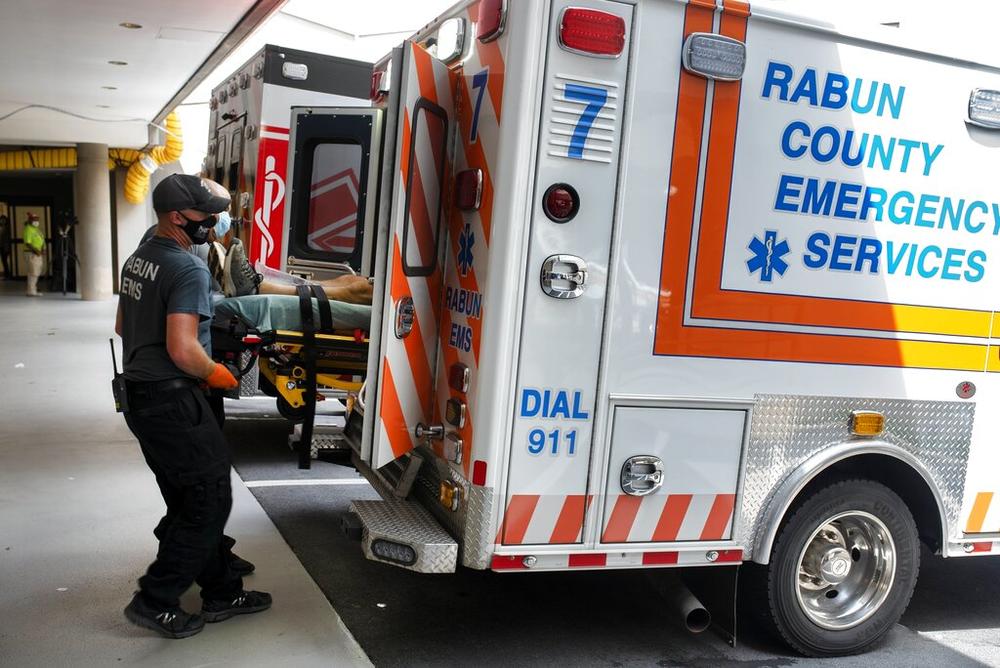
Section Branding
Header Content
Georgia Today: Effort to curb mining near Okefenokee; modernizing prisons; inflation's link to crime
Primary Content
On the Thursday Jan. 26 edition of Georgia Today: Lawmakers want to block mining near the Okefenokee Swamp, Georgia is modernizing its prisons, and inflation and job automation have both led to an increase in crime.

Story 1
A South Georgia lawmaker has introduced legislation in the house this week aimed at blocking mining near the edge of the Okefenokee Swamp.
Republican state Rep. Darlene Taylor of Thomasville filed legislation that would not halt Alabama-based Twin Pines Minerals' pending applications to mine titanium along Trail Ridge near the Okefenokee, but would affect any filed after July 1.
Opponents fear mining near the swamp’s edge could cause irreparable damage.
Story 2
Georgia House Republicans are backing legislation that would increase the statewide cap on income tax credits offered to donors to a fund that provides private school scholarships.
House Bill 54 would raise the cap from the current $120 million per year to $200 million.
The cap has been raised multiple times over the past five years. Christy Riggins, director of the American Federation for Children's Georgia chapter, says donors have immediately matched it each time it's been raised.
Democrats have opposed using state tax credits to help fund private school scholarships, saying it has diverted government resources to private education.

Story 3
Details are beginning to emerge about how the Georgia Department of Corrections will use the $600 million allocated to it in last year’s state budget to modernize its prisons.

Story 4
A stopgap measure will keep ambulance services running in Augusta.
EMS provider Gold Cross gave notice to state on Monday that it would be pulling out of the area next week after it couldn't reach a deal with Augusta-Richmond County commissioners.
Yesterday, the company and commissioners agreed to a month-to-month contract to give local officials and state regulators time to find a new provider.
A statement from the Department of Public Health applauds the temporary agreement and says the process to find a new provider will begin next week and take several weeks.
The end of the 17-year relationship between Gold Cross and Augusta-Richmond County comes after years of disagreements over service levels and funding.

Story 5
Atlanta began its annual count this week of people facing homelessness.
The point in time or "PIT" count determines federal funding.
Story 6
Research shows an increase in crime is caused in part by economic stress, and that stress is caused by a variety of things. Right now in Georgia two things are major contributors: inflation and the automation of jobs that were once performed by people.
Dr. Patrick Dicks has been researching the connection between automation, inflation, poverty and crime. He spoke with GPB's Peter Biello.
Transcript:
Peter Biello: I want to start first with the connection between economic stress and crime. How would you connect those things?
Dr. Patrick Dicks: When you don't have money — with the price of everything? I was looking at statistics: The average one-bedroom apartment in Atlanta is $1,936. The average American only makes about $40,000 a year. So when you don't have the correct funds or enough money to pay, people are going to go out by any means necessary to fill that void so they can have shelter, food, etc. for their families. So that definitely influences the rise in crime.
Peter Biello: You have also done some research on automation. I want to ask you about that, in part because this has been a concern for economists for quite some time now. Can you talk a little bit about the concerns about the rise in jobs becoming automated and the rise in crime.
Dr. Patrick Dicks: With the price of labor going up with inflation, a lot of companies now are saying, "Okay, time out. If you want $15 an hour, what does it cost me to automate that process? If I can spend $2 to $3 million to get the machine in here and all I have to do is pay a licensing fee—" So companies are looking out and saying, "People don't want to come back to work. People are saying, 'I need a higher wage.' Let's find out and research how we can make things more efficient." The theory of any business is to do more with less, but continuous flow. Keep things, keep running. That's why automation is becoming more paramount. How can we continue to make a process run more efficient with less people?
Peter Biello: Under Gov. Kemp's administration, we've seen a lot of green jobs come into Georgia. Is that in itself a concern?
Dr. Patrick Dicks: So those jobs are coming. What they're not telling people is these jobs are for specialized skill sets. In my research, you have a specialized skill set so the thing that will be deemed as transferable. Those jobs are coming for people that have the skill set and have the technical and analytical skills to complete those tasks.
Peter Biello: So in other words, Georgia needs to prepare for people to come in from out of state for these jobs. These aren't things that are going to be easily filled by people who happen to already be here.
Dr. Patrick Dicks: No, unless they have a STEM background or they have a blue collar background because to put down those solar panels or, you know, a solar farm, that requires someone that knows about architecture, somebody that knows about construction. So it is a special — specialized skill set. And then you have the people that actually have to run it. Many of those things are run by computer systems. So we have to remember if we're taking energy and storing it at 3:00 in the morning, we have to have ... some kind of computer software that could say, "Hey, this area is using more. If somebody is not there, can this thing still run?" So the specialized skill sets that are coming in — it's just like when they say manufacturing jobs are coming back to America. They may be coming back, but for who? They have advanced manufacturing now that builds cars. They are trying to take people out of every facet of the operation.
Peter Biello: So what kind of jobs are going to be left for human beings to do, in your view, once automation reaches its peak?
Dr. Patrick Dicks: Primarily blue collar jobs. You know, HVAC, electrical. Over here, I'll give a perfect example. We had that record freeze the week of —nthe week before Christmas, I think it was that weekend I saw on the news pipes over here bursting, sheet rock, electrical. None of that was white collar. That was blue collar. Those guys over here made millions of dollars because you can't just have water pouring out. Those types of jobs are going to be here. People that can fix things, electrical HVAC, landscaping, construction. Once they start building an interstate, they may have the aid of a computer system to help them, but it still takes manual labor to get there. Somebody has to bring the I-beams to build buildings, and the other kind of white collar jobs that will be here will be technical and analytical. The days of just getting a degree out of college saying, "I'm going to work a posh job" are over. I mean, those jobs are over. Those jobs are going to be gone. We don't really need people to do a lot of things anymore. And my saying is: if your job or skill is not helping move society forward, you are going to become obsolete. So those are the fields and the skill sets that you're going to have to have to be marketable and employable in the future.

Story 7
A Democratic National Committee panel has voted to give New Hampshire and Georgia more time to make changes that would allow both to be part of a revamped group of five states leading off the party’s presidential primary starting next year.
The committee previously voted to approve a plan championed by President Biden that would replace the Iowa caucuses as the first in the nation with South Carolina; New Hampshire and Nevada would then go second, followed by Georgia and then Michigan.
New Hampshire and Georgia now have until June 3 to meet the deadline.
GPB's Georgia Today newsletter hits your inbox on Tuesdays, Wednesdays and Thursdays with top stories from around the state featuring news, politics and more. Subscribe here.



